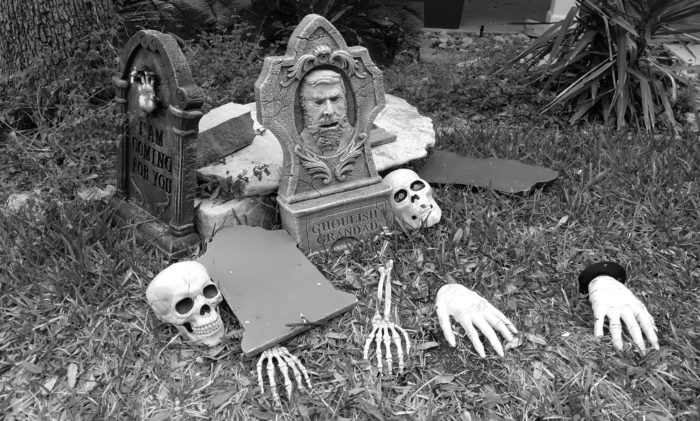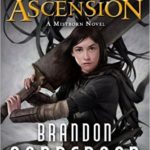Halloween and the Aesthetic of Evil
A while back, Steven Wedgeworth wrote an outstanding essay over at The Calvinist International on the origins of Halloween.1
It’s an annual must-read. The CliffsNotes version is that Halloween is not some vestige of ancient paganism or even a Christian subversion of demonic shenanigans (as a lot of Christian writers have claimed over the years). The truth is actually pretty boring. Halloween as we know it is little more than a 20th century invention designed to sell stuff.
After I posted Wedgeworth’s piece, some friends of mine raised the somewhat different objection that no matter what the origin of Halloween, it’s still “dark,” which violates 1 Corinthians 6:14-18.
“Witches, ghosts, demons, and death–” remarked one friend–“why would I want anything to do with it?”
It’s a common question, so let me take a stab at answering it.

First, “darkness” in such criticisms is ill-defined. What does it mean, exactly? I’m inclined to think from the context that my friends and many others who use the word this way mean something like “menacing,” “fearful,” or “sinister.” Perhaps their intended meaning is just “ugly.” Halloween can be ugly, certainly. I don’t know anyone who would be flattered if you told them they had a smile like a jack-o’-lantern, or a zombie-like complexion. But what’s wrong with ugliness, if used in the right way?
I know people who don’t watch or read The Lord of the Rings because it has too much “darkness” and “ugliness” in it. They don’t like the look of orcs and Nazgul, and think these baddies must have something to do with Satan. Well, they do. That’s the point! Tolkien’s story is rooted in a mytho-poetic battle between good and evil—one that makes it clear we each have varying amounts of both in us. And by placing appearances over storytelling, critics who balk at “darkness” or “ugliness” miss out on the best Christian fantasy of the 20th century, among many other wholesome, worldview-shaping works of art.
Christians who object to Halloween often confuse aesthetics with morality.
This is why I think that Christians who object to Halloween often confuse aesthetics with morality. It looks evil, therefore it actually be evil. There’s no way to redeem the spooky or the dark. Contra Frodo, they think that if it looks foul, it must really be foul, and if it looks fair, it must really be fair.
This is part of a more pervasive evangelical failure to appreciate the full scope of human experience, and the grand sweep of God’s redemptive story. I think of the New Testament’s vivid pictures of Hell as well as its rapturous portrayals of the New Jerusalem—of its hair-raising bestiary of symbolic evil as well as its awestruck glimpses at the transfigured Lord. You can see the result of this one-sided aesthetic in many churches. “Dark” imagery, such as that found in some of Christianity’s greatest works of literature, is no longer allowed, and neither is mournful or sorrowful music, which has historically played a key role in the Church’s worship and liturgical life.
The evangelical reaction against the sugar-saturated, commercialized shindig we call Halloween displays the tendency of many modern Christians (I’m going to say it—particularly moms) to mistake the aesthetic of evil for actual evil. In this way of thinking, spiderwebs and paper witches stand in as signs of moral corruption and rebellion against God. The outward tokens of the sinister, the predatory, and the ugly proclaim allegiance to the author of the fall and the father of lies.
But the Bible seems to hint at rather the opposite arrangement. While the Son of God “had no form or majesty that we should look at him, and no beauty that we should desire him,”2 “Satan himself masquerades as an angel of light.”3 If the New Testament’s warnings are taken at face value, there’s more spiritual danger in the radiant smile of a false prophet than there is in all the latex werewolf masks Spirit Halloween supply can sell. The forces of the enemy present themselves as lovely, successful, happy, and holy precisely because such things are appealing. We buy products from beautiful people, after all. The homely seldom show up on billboards.
Certainly, if Satan had a physical form, it would be terrible. He is figuratively described by John as a dragon. If there is a lesson in Genesis 3, it is that moral corruption inevitably corrupts creation. All ugliness as we know it is ultimately a consequence of sin, and the damned are, as C. S. Lewis puts it in The Weight of Glory, “immortal horrors”—to themselves, no doubt, most of all.
Some may argue from this fact that Halloween still “celebrates” evil by encouraging us to revel in decorations, costumes, and entertainment that look like they were chosen by Hell’s interior designer. I don’t buy this. Aside from the change of seasons, tasty treats, and (as happens at every holiday) overindulgence in alcohol—it seems to me that what most people are actually celebrating on Halloween is fear. More precisely, they are taking pleasure in being afraid, just as people who ride roller coasters or watch suspenseful movies are doing the rest of the year. It feels good to be afraid. It triggers adrenaline and dopamine rushes. It makes you feel alive to fear for your life (even if it is only a game). It can even be kind of romantic.
Celebrating fear is a far cry from celebrating evil. Indeed, it strongly suggests that the things we fear really are dangerous, and need to be subdued or destroyed.
Celebrating fear is a far cry from celebrating evil. Indeed, it strongly suggests that the things we fear really are dangerous, and need to be subdued or destroyed. Almost all good stories trade in fear, because a plot requires a villain, and a villain not worth fearing is not worth writing or reading about. Fear is the spark that gets the engine of every epic turning, and makes us turn the pages, too, if I may be permitted to mix metaphors. Sauron is scary. Lord Voldemort is scary. Jaws, the walking dead, and the creature from the black lagoon all trigger fear. They also inspire us to root all the harder for the hero of the story. And therein, I think, lies the real value of fear, and of days like Halloween.
As with all things, the rules of prudence and good taste apply. Placing re-creations of bloody chainsaw massacres and replicas of bodies in sundry states of decay in your yard is not very charitable to your neighbors. And fixating on the spooky, without acknowledging the story of redemption which gives it meaning, is not healthy either. But it’s clear to me that in rejecting Halloween on aesthetic grounds, Christians are making a category error. Darkness is not evil. And confusing the two can do more than blind us to real spiritual danger. It can keep us from appreciating the victory of our Savior over all that we fear.
- This article is based on the original version at G. Shane Morris’s personal page, “Halloween and the Aesthetic of Evil,” Troubler of Israel, Patheos, Oct. 24, 2016. ↩
- Isaiah 53:2. ↩
- 2 Corinthians 11:14. ↩











































It’s a transversive holiday used as a societal release valve. Traditionally Mardi Gras performs this role in more Catholic societies. Back in the medieval era, it was the twelve days of Christmas that weren’t part of the canon calendar .
Whether or not it’s merely aesthetics and thrills or actually reveling in evil is going to depend on the person. It’s probably kind of like the more pagan elements of Christmas in that some people actually take some of the more problematic parts and believe/act on them in some way. The fact that some people do actually do participate in the more pagan aspects of it might be why some Christians are so opposed to it.
I’m not really into Halloween either way. I kind of like that it exists as one of the aesthetic things of fall, but actively participating in the festivities is rare for me, aside from the fall festival type stuff when I was a kid.
Very perceptive.
It may be a matter of opinion and interpretation, I am really not sure. We will find out one day who God agrees with. In the meantime, I disagree. For one think I think you are comparing apples and oranges when you compare Halloween to a story of good and evil. In a good story, good wins, as it does in reality. The story is solidifying that truth in our hearts. Regarding Halloween, there is no good or redemption at the end of the story. That’s why I don’t watch zombie shows or shows where villains are hero’s. (Villain all the way along who sometimes does good things = current state of unregenerate folks now.) They are different from where a bad guy (us unregenerated) becomes a good guy (us regenerated). Halloween is glorification of evil, wickedness, Satan, and fear. There isn’t a knight in shining armor who comes in right before midnight who vanquishes the bad guy. The bad guy lives on, still bad, to return next year, enticing children to look into witchcraft, seances, spells, blood, etc. Another point is that God tells us not to be afraid over and over in the Bible. I know from experience also how fear messes up our mind. My unregenerated high school self liked shows like Friday the 13th and the other scary 70’s movies. When I was 19 my friend and I stayed in a cabin alone in the mountains. We were terrified when we heard noises outside after dark and thought we were going to die. The next morning we learned it had been horses walking around. Now, as a regenerated adult, I’m sure Satan delighted in our fear. God probably felt bad for us and would have liked to save us from that terror. Of course I didn’t learn then. It took me having to sleep with all the lights on in my apartment before I realized I couldn’t take horror shows. I know people are different. But just because someone likes something , such as an adrenaline rush from fear, doesn’t mean God wants them to have it. I guess that’s between you and Him one day. I don’t condemn you for it. I know it’s not right for me, and, yes, as a mom, I have chosen that path for my kids.
“Regarding Halloween, there is no good or redemption at the end of the story.”
What story?
Who’s telling it?
Bear in mind that I didn’t grow up with all those movies, and in fact grew up with zero Halloween-related traditions. But this alone calls into question the belief that Halloween would only have one “story” that we’re all assuming.
To put on my armchair psychologist hat, the story she tells herself to cope with her anxiety is the story of The Happy Christian Family Who Did Everything Right And Therefore Nothing Bad Ever Happens.
Spoilers, it is not a particularly good coping mechanism.
Funny, I have no anxiety. I know the difference between good and evil and I know who’s I am. I also know enough about God’s word to be able to let it inform my whole life. God never promises things will go well in this life. Actually He promises us just the opposite. He tells us the world will hate us because of Him and He’s told us trials will make us into the image of Christ, but that He will walk beside us through all of the trials and that with make us closer to Him. I know my Lord. I know how much He loves my family and me. After all He gave His life for us. Just as He gave His life for you, because He loves you.
Whose image are you being made into? It’s an eternally important question. I pray that you have recognized the sin in your life, as I did in mine, and that you have received the gift Jesus wants to give you of His death on the cross to pay for your sins. He desires that none would perish but that everyone would turn from their sins and be saved. I pray that for you. Have a blessed day.
True, I could be wrong about how much anxiety plays a part in your motivations. I’m just a stranger on the Internet. But if some of my guesses about how your kids feel about your control are or end up turning right, then defensiveness isn’t going to help.
What I meant was that we have all the days of preparation for the day of Halloween, the day of Halloween comes, and then is over. There is no redemption at the end of the day of Halloween. It’s just a time of evil. Blood, murder (fake of course, with costumes with axes dripping with blood and fangs dripping with blood, etc.), bones, tombstones, black cats, witches, darkness, the color black, etc. There is no redemption at the end of the day. It’s, from start to finish, a time to glorify evil. It’s not a time of life, love, goodness, light, color, and flowers. In everything we do we are to glorify the Lord. Halloween doesn’t do that and actually does the opposite.
I don’t know where you grew up but I think it would be impossible for someone to grow up in the U.S. and not grow up with Halloween related traditions. You had parents with great fortitude because it’s all around us and the peer pressure is huge. Kids are pressured by their friends to dress up and T or T. Parties in public school call for costumes. Stores do big business with all the merchandise they sell. But we’re speaking generalities here and you were the exception not the norm.
After rereading everything, I’d like to add this. The Halloween story I’m talking about is the one our culture is telling. Stores selling evil, public schools encouraging parties (parties are great. Better if a school does something like character day and all the kids dress up like their favorite storybook character, instead of the teacher dressing up as a witch and putting witches all over the classroom—my daughter had one school do the first and one do the second.), friends wanting to dress up together and peer pressure to dress up, parties with witch’s brew to drink, bobbing for eye balls, trick or treating (give me candy or I’ll do something bad to you, really?), and movies that have blood and fear in them. Did you know there are actually real life witch covens meeting? Our culture has a very distinctive Halloween story. We might not all take part in all of it, such as the coven meetings, but it’s there and it glorifies Satan not God.
My family was never into Halloween for similar reason, and I’m not particularly fond of the holiday either, but not everyone celebrates it for the same reasons you cite.
A story doesn’t have to have a happy ending or have some sort of redemptive arc in order to be good, though. Some stories can be dark most of the way and still have something important to teach us. A sort of cautionary tale, basically. Not nearly all biblical stories even have a happy ending (or at least not completely) Or, dark stories can be complex studies of human nature. (I’m not just talking about horror here, but also shows like Breaking Bad)
I don’t know if the typical ‘good always wins’ trope is even healthy if it’s the only narrative a child is fed. It doesn’t do enough to teach people about negative consequences, because the main chars in good always wins stories tend to be a bit two dimensional with very few obviously detrimental flaws. If they do something wrong, it usually gets resolved quickly instead of having huge, negative consequences. This is bad because people have to realize that it is possible that making a bad choice will completely ruin the rest of our lives if we don’t take the proper steps to get ourselves out of the hole we dug, and darker stories can be very good at expressing the results of bad choices and encourage us to make the right ones.
And while I don’t think people should just sit there and constantly watch horror just for the sake of desentitizing themselves, there’s also the fact that hiding from one’s fears (even if they only exist in a story) can leave someone more fearful than they would have been otherwise. As for the villain thing, that depends on who watches it and why. A lot of times, viewers won’t actually glorify the villain, but instead be angered by him, or they will think ‘I never, ever want to be like this person, and if I meet someone that starts to act like this villain I will avoid them at all costs.’
I almost wanna speculate on how much her children have rebelled once they got out from under her thumb, ’cause I’ve been there and gotten the T-shirt. To cite the Tarkin Effect, the more you tighten your grip, the more planets slip through your fingers.
Yeah, though that kind of depends on a lot. Some parents ban their kids from Halloween, but aren’t super horrible about it. And of course it depends on how the kid is(I didn’t mind the bans because I didn’t care about Halloween).
But I did kind of get more distant and intent on setting boundaries and things like that when it came to other subjects. I didn’t get all that rebellious about it, though, or at least not to the extent that people consider typical.
I think ghosting on your controlling parent is more common than a blowout fight. Only telling them a carefully edited version of your life to keep the hand-wringing at bay.
It still takes work, wearing that mask.
Maybe. It’s actually not that hard for me since I keep a lot of things to myself regardless. Often enough for me it’s not so much about wearing a mask as it is losing the desire to share certain things, so I reflexively don’t even mention them in the first place.
Sometimes I even prefer it that way, because then it’s like I have a series of precious little things close to my heart that make me happy but aren’t being intruded on by other people.(I haven’t blatantly mentioned to them that I’m pretty much an old earth creationist now. I don’t think they’d get super mad or anything, I just never really mentioned it, and as weird as it sounds it’s just one of my little precious things that feels good not to discuss with people I know in real life.)
That said…I have pretty weird and even anticlimatic reactions to certain things. I’ve also been constantly teaching myself not to let other people’s jerkishness get to me, so sometimes when people get mad at me (for no good reason) I’m actually pretty good at shrugging my shoulders and thinking ‘Oh well.’
If a family has love and understanding and an acknowledgement that all are sinners and far short of God’s standards I think that helps kids feel like they don’t have to wear a mask. My mom is unsaved and she wouldn’t let me do anything and thought she was always right and would never listen to me. I became sneaky and sometimes did the opposite of what she wanted just because I didn’t like her. Fortunately I learned from my mom’s mistakes and, after I gave my life to Him, God also made me act differently. I am able to admit my mistakes, apologize to my kids, cry in front of them, and because I can be real, I think that gives them permission to be real with me. It also helps that I don’t fly off the handle with them when they do mess up. Why should I? I mess up and God doesn’t fly off the handle with me. I even mess up with my kids and God comes in and cleans up behind me. He has done a great job helping us and bringing us all through, closer to Him and to each other.
Well, my mother wouldn’t even be reading a blog about fantasy . . . so points to this mom for that.
But yeah, I’ve totally handed out trick or treat candy the last couple years. My mom would not be happy if she knew.
I know someone that hands out candy for trick or treaters, but the candy has Bible verses on them, so some people do it as a ministry or they participate but not in a way that dwells on the more ghastly side of Halloween.
I praise God that both my girls are saved and love God with all their hearts. I have no idea how you grew up but in my experience, and from what I’ve seen in other families, the families who only talked the talk and didn’t walk the walk and teach their children as God commanded, they lost their children. The children saw them as hypocrites. Now by teach their children, I don’t mean homeschooling. Both my kids went to public school but I lived the Godly life and I taught them too also. I didn’t leave teaching them about Christ up to the church. Christianity is our way of life not just a Sunday thing.
Regarding Halloween, my second daughter did not go to school on Halloween, we went swimming with friends or did something else fun. I was unregenerated with my first daughter and she did all the Halloween stuff at school. With 12 years between my girls and getting saved when my 2nd was 1 1/2, they were raised a little differently. But they also went to different schools, lived in different towns, I worked with one and not the other, and they had different Dads.
Good points, even if I don’t necessarily agree with all. The one point I’d make regarding watching shows where bad things happen, that’s all well and good, and I agree, we watch and learn where our actions could get us and hopefully avoid that ourselves. The problem with shows in our culture now is that we do bad things and many times, in some shows, there are no consequences. Life goes about hunky dory and all is well. Unrighteousness is gloried, there are no consequences, and the wrong lesson is learned.
Maybe, though that kind of depends on who watches the show. A lot of times I see people saying that about shows that actually DO show a lot of consequence and positive lessons(such as Fate Zero). It depends on how much people actually pay attention to the show and focus on self improvement, and paying attention and self improvement is something we need to teach the next generation to focus more on.
I think as a culture we need to think about how we interpret consequence, too. Consequence isn’t just something painful happening to us. Letting bitterness, trauma, etc. turn us into horrible people definitely would be a consequence, and that consequence exists in a lot of the movies you speak of, whether or not those villains end up with a blatant consequences like dying or getting thrown in jail.
“Perhaps their intended meaning is just ugly.” Wow, if I could put words into the mouths of and assign whatever meaning I want to the arguements of the side I am debating against, I could win every time.